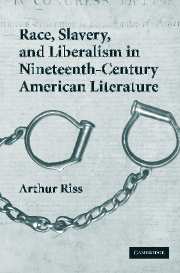Book contents
- Frontmatter
- Contents
- Acknowledgements
- Introduction: the figure a “person” makes: on the aesthetics of liberalism
- 1 Slaves and persons
- 2 Family values and racial essentialism in Uncle Tom's Cabin
- 3 Eva's hair and the sentiments of race
- 4 A is for Anything: US liberalism and the making of The Scarlet Letter
- 5 The art of discrimination: The Marble Faun, “Chiefly About War Matters,” and the aesthetics of anti-black racism
- 6 Freedom, ethics, and the necessity of persons: Frederick Douglass and the scene of resistance
- Notes
- Index
1 - Slaves and persons
Published online by Cambridge University Press: 22 September 2009
- Frontmatter
- Contents
- Acknowledgements
- Introduction: the figure a “person” makes: on the aesthetics of liberalism
- 1 Slaves and persons
- 2 Family values and racial essentialism in Uncle Tom's Cabin
- 3 Eva's hair and the sentiments of race
- 4 A is for Anything: US liberalism and the making of The Scarlet Letter
- 5 The art of discrimination: The Marble Faun, “Chiefly About War Matters,” and the aesthetics of anti-black racism
- 6 Freedom, ethics, and the necessity of persons: Frederick Douglass and the scene of resistance
- Notes
- Index
Summary
Since slavery systematically negates the fundamental ideals of liberal political theory – in particular the ideals of autonomy, individual consent, equality before the law, the protection of personal property, etc. – it has long stood as the archetypical antithesis of liberalism. Indeed, ever since John Locke, who is conventionally considered the principal theorist of classic liberal theory, the institution of slavery has marked the historical and theoretical limits of liberalism, representing the tyranny against which liberalism is articulated and measured. Establishing this foundational opposition at the beginning of his First Treatise of Government, Locke stated, “Slavery is so vile and miserable an Estate of Man, and so directly opposite to the generous Temper and Courage of our Nation; that 'tis hardly to be conceived that an Englishman, much less a Gentleman, should plead for't.”
The general claim that slavery is the litmus test of liberalism, however, has not been as perspicuous and straightforward as one might expect. What might seem a singularly neat opposition has, in fact, proven remarkably untidy. Thus, Locke – despite championing liberty, demonizing slavery, and being an English Gentleman – not only “pled for” slavery and invested in the colonial slave trade, but also, as secretary to the Lords Proprietors of Carolina, helped write the Fundamental Constitution of the Carolinas, a piece of legislation that declared that “every freeman of Carolina shall have absolute power and authority over his negro slaves.”
- Type
- Chapter
- Information
- Publisher: Cambridge University PressPrint publication year: 2006

